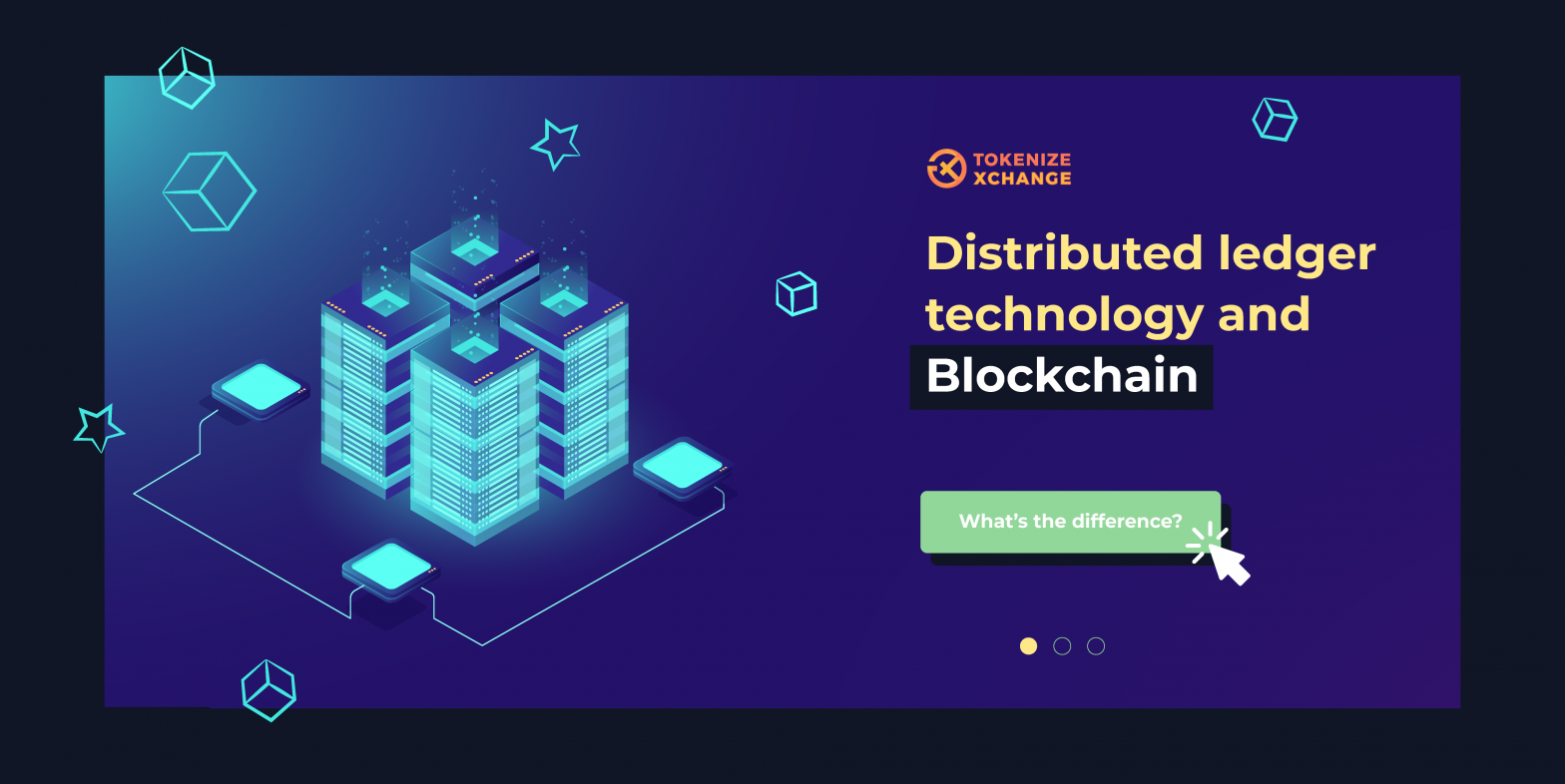Distributed Ledger Technology (DLT) is a collection of databases that are not stored or verified by any central authority. It sounds quite the same to Blockchain, right? However, it is just a common misunderstanding that many people have. In this article, Tokenize Blog will go into the definition and the application of each technology to help you get the difference between Distributed ledger technology and Blockchain.
With the rapid spread of cryptocurrency, blockchain has hit the headlines along with the updates of Bitcoin as the technology of the future. First of all, let’s see what distributed ledger technology is.
Distributed Ledger technology vs Blockchain Technology
Distributed ledger technology explained
A distributed ledger is a digital database existing among several participants in different geographical places. On the contrary, most companies and organizations use centralized databases that exist in a certain location to manage their business.
The distributed ledger helps eliminate a disadvantage of the centralized database that is the risk of manipulation. Also, DLT gets rid of the central authority to control, process, or record transactions. Distributed ledger technology is used widely to process and store a large amount of data every day with the consensus of parties involved.
Now you have seen some advantages of Distributed ledger technology compared to the traditional centralized ledger.
The difference between traditional Centralized Ledger and Distributed Ledger
- The centralized database faces the risks of security vulnerabilities by cybercrimes, for example, hackers or viruses, and the delays due to slow authority’s process of data updating.
- DLT provides high protection to data and information by applying cryptography. Cryptography is a method of keeping and spectacularly transferring data that only people who are involved can read. Not only does this technology improve security but it also helps in authentication and verification.
Some entrepreneurs that prefer distributed ledger over Blockchain include Google, through its recent work with Digital Assets to bring development tools to users of the Google Cloud Platform. In the meanwhile, Volkswagen created their partnership with IOTA for testing distributed ledger technology.
Now you have an overview of DLT, let’s dive into blockchain technology to see how Distributed ledger technology and blockchain are different from one another.
Blockchain Technology
“The blockchain is an incorruptible digital ledger of economic transactions that can be programmed to record not just financial transactions but virtually everything of value,” Don & Alex Tapscott, authors of Blockchain Revolution (2016).
Blockchain helps answer the question: what is a cryptocurrency backed by? Though it sounds complicated, blockchain can be understood as a kind of database that is distinguished from other databases by its information storage method. When new data is created, it is put into a new block. The new block and old block will be chained together, making a system of information.
Blockchain Technology is applied in many industries, especially in cryptocurrency
In the case of cryptocurrency, blockchain is used as a decentralized system, therefore, it cannot be controlled by any individuals or institutions. All transactions performed are recorded and are never removed.
By allowing digital information to be distributed but not copied, blockchain technology eliminates all intermediaries, enhancing security, transparency, and stability as well as minimizing costs and errors made by humans, which are similar to DLT.
One of the most important applications of blockchain is cryptocurrency. Bitcoin can be the pioneer of blockchain. After the surging growth of Bitcoin in 2017, blockchain technology started to get more attention.
Distributed ledger technology vs Blockchain
It can be said that blockchain is one type of distributed ledger. And distributed ledger is not the same thing as blockchain technology. Here are some factors to distinguish between Distributed ledger technology and Blockchain.
Block form
The first thing to distinguish between these two technologies is that Distributed Ledger is not made up of a chain of blocks. Instead, the database will be stored on many different sites or regions connected to ensure that the latest transaction data and the most accurate updates are maintained. Besides, not all DLT requires a chain of blocks to supply valid and secured decentralized consensus.
Sequence
All the blocks in the blockchain technology are in a specific sequence which is the factor that distinguishes it from other DLTs. However, a particular sequence is not required in distributed ledger technology.
The potential of distributed ledger technology
According to Coindesk, Sen. Cynthia Lummis said that the U.S government should make distributed ledger technology one of their priorities. She is now a sponsor for an amendment to put blockchain to the “Endless Frontier Act” which will set 10 “technology focus areas” for the new entity to assess and make a federal strategy to address.
This Act was firstly introduced in 2020 to push the National Science Foundation – an organization that has the purpose of supporting research in the engineering and science field.
“China is already rolling out a digital yuan in select cities, and they want to use it ultimately to undermine the position of the U.S. dollar in the financial world,” Said Lummis “This is a national security issue, and if the U.S. does not respond, we will be left behind”.
Lummis’s claims have shown the effort of the U.S government in the race of technology innovation in general and in cryptocurrency in particular. This is not the fear of missing out on problems, but the urge of catching up with the global trend, which opens more opportunities for cryptocurrency to be accepted as a payment method in other countries.
In conclusion, DLT is the parent technology of blockchain. Now you have seen the difference between Distributed ledger technology and blockchain as well as its potential in the era of digital currency. Don’t forget to follow Tokenize Exchange for more updates on products, technology, and the market!
Subscribe to Tokenize Blog
Get updated with our guides, tips, and market news to help you in your investment.
Follow Tokenize Exchange on Facebook, Telegram, Medium, Twitter, Instagram.




